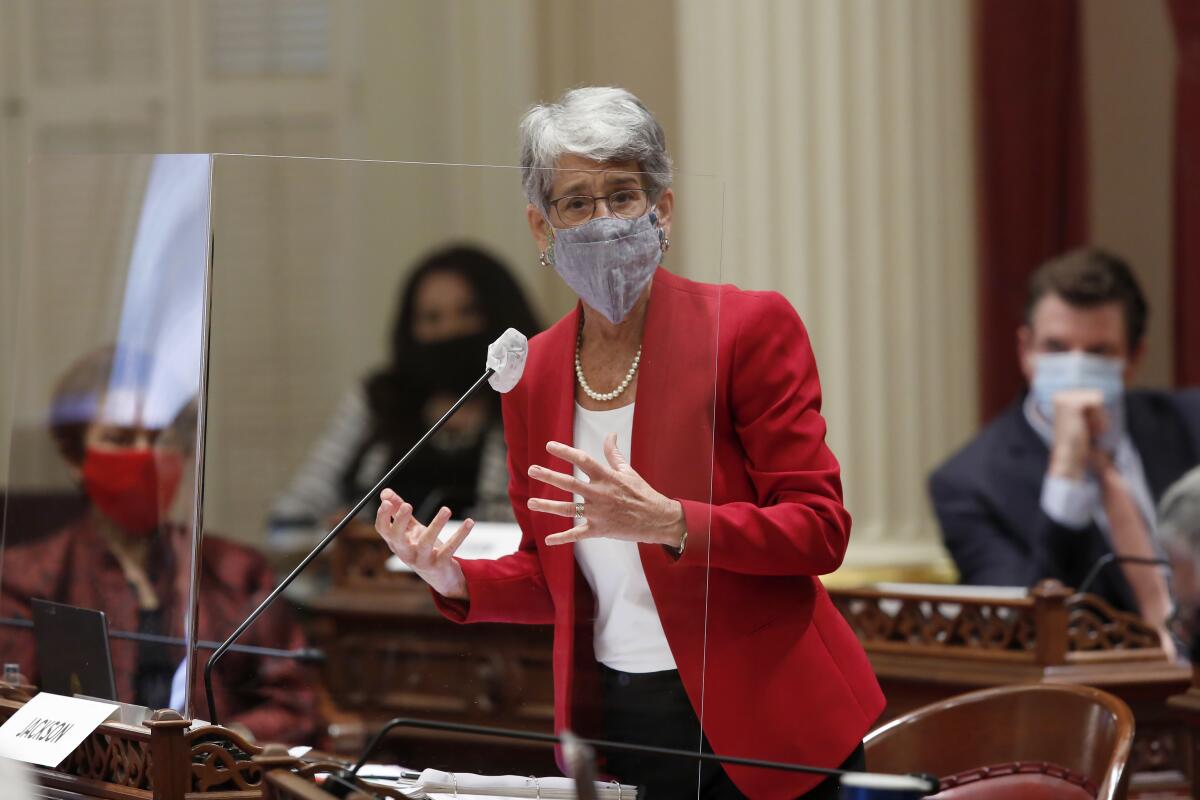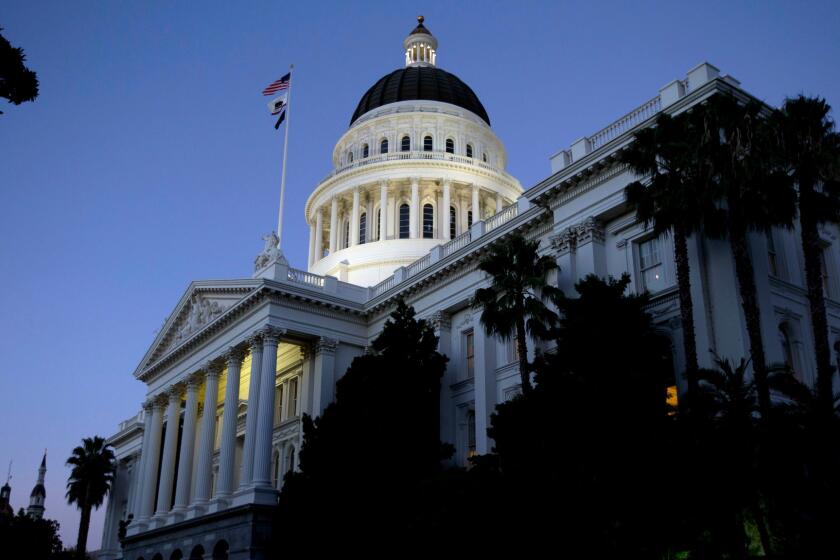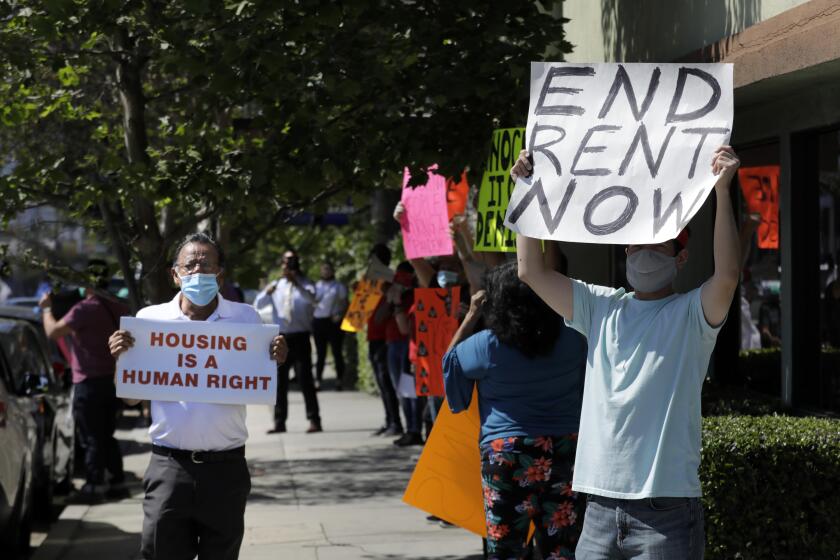Millions of Californians would be eligible for job-protected leave under plan approved by lawmakers

- Share via
SACRAMENTO — California lawmakers voted Monday to remove a key hurdle that new parents and employees caring for sick family members say keeps them from using the state’s paid leave program by offering job protections to those workers.
Senate Bill 1383 by state Sen. Hannah-Beth Jackson (D-Santa Barbara) would provide millions of employees who work for smaller businesses with the same 12 weeks of job protections while taking family leave as those who work for larger companies. The bill now heads to Gov. Gavin Newsom, who has said he will sign it.
“Access to family leave is especially critical amid COVID-19 when workers need to take time off to care for themselves or their loved ones,” Jackson said. “Yet without job protection, many workers fear losing their job for taking the Paid Family Leave benefits they pay for. We should be encouraging people to stay home if they are sick, not forcing them to choose between their health and their job.”
California’s paid family leave program allows workers to take time off to bond with a new child or care for a sick family member while receiving 60% to 70% of their weekly salary for eight weeks. Employees automatically pay into the program through the state’s disability tax, but not all workers say they feel they can use the benefit. Many employees, particularly low-wage workers, said they fear that if they take time off they would not have a job to return to.
Currently, companies with 50 or more employees are required to provide 12 weeks of leave to care for a new child or family member. The threshold for parental leave is lower, allowing 12 weeks of job-protected time off for workers at companies with 20 or more employees. Under SB 1383, companies with five or more workers would have to provide 12 weeks of job-protected leave to employees.
Supporters of the bill said providing job protections will ensure that employees who pay into the state’s paid family leave program can use the benefit. Lack of job protection is a key reason cited by new parents who declined to take paid family leave when needed, particularly among low-wage workers, who are more likely to work for smaller companies, according to a 2018 survey by the California Employment Development Department, which administers the program.
California’s Legislature adjourned with some lawmakers and activists frustrated that more was not done to address deep troubles facing the state’s residents.
Of the 6.8 million workers in the state who earned less than $20,000 in 2018 and paid into the program, less than 46,000 used paid family leave, according to a legislative analysis of the bill.
William Dow, a professor of health policy and management in the School of Public Health at UC Berkeley, said because more people of color who are parents work for smaller employers than their white counterparts, the current law does not provide the same level of benefits to everyone who pays into the program.
Dow said there are other factors that cause new parents to decline to use the full extent of their paid leave benefits, such as a lack of awareness as to who qualifies and lower wage replacement, but providing job security will fix a key concern.
“In our survey of new parents, we have 10% of new mothers who don’t take as much leave as they would like because they don’t have job protections,” said Dow, who studies paid leave policies.
SB 1383, however, has drawn concerns from business groups and Republicans, who say now is not the time to add new mandates to businesses struggling during the pandemic. The California Chamber of Commerce, which has opposed previous efforts to expand unpaid family leave, included the bill on its annual “job killer” list that highlights laws corporate interests say will hurt employment and the economy.
Assemblyman Kevin Kiley (R-Roseville) said family leave is good policy, but that “this bill goes about the goal in all the wrong ways.” Kiley read comments he said were from small business owners in the state who believe the bill would have devastating effect.
“This bill will sound a death knell for even more small businesses across California,” Kiley said.
The bill makes it illegal to deny an employee’s request for 12 weeks of unpaid job-protected leave during a 12-month period when the reason is to care for a new child or family member, including a parent, grandparent, grandchild, sibling, spouse or domestic partner.
Protections against eviction are extended by five months for California renters facing financial hardship because of the COVID-19 pandemic.
SB 1383 would also grant spouses that work for the same company to each have 12 weeks of leave, instead of requiring that both parents split the full time off.
Under Jackson’s bill, the state would also lower the threshold for four months of job-protected pregnancy disability leave, requiring companies with five or more employees to provide the benefit.
California became the first state in the nation to create a paid family leave program in 2004, but supporters said the state has not done enough since then to ensure the program benefits everyone who is eligible to take time off.
“I’m going to be honest, this is a simple question: Do you think a woman who just had a baby who works for an employer with 19 people should be able to spend time with that child and not risk losing her job with not a cent paid by that employer?” said Assemblywoman Lorena Gonzalez (D-San Diego) as she urged her colleagues to support the measure. “She has already paid into the system. It is her money she is getting back.”
More to Read
Sign up for Essential California
The most important California stories and recommendations in your inbox every morning.
You may occasionally receive promotional content from the Los Angeles Times.













